WESTERN Cape Premier Helen Zille will never forget the day Buddy Chaaban tried to lead a coup in the City of Cape Town.
The eccentric leader of the New People’s Party was invited to join a seven-party coalition that governed the City of Cape Town after the 2006 local elections.
No party won 50% of the vote, so with its 42%, the Democratic Alliance (DA) rounded up six rivals to join it in a coalition.
In no time, Chaaban felt the coalition government did not offer him a role that was in line with his perceived contribution or influence. He demanded the position of deputy mayor, threatening to take his support to the African National Congress (ANC).
"Of course, I did not let him," says Zille, who was Cape Town mayor between 2006 and 2011.
She has just completed a chapter on running that coalition administration for her much-anticipated book due later this year.
"It’s very hard to govern a coalition, especially when you have lots of parties, each of which has the balance of power to bring down the government," she says.
The prospects of coalition administrations in municipalities have increased since then as support for the ANC declines, and could be a game changer in several towns and cities in this year’s local elections.
Keeping small parties alive and competitive can be incredibly difficult, as they do not have the financial muscle and campaign platforms enjoyed by the bigger ones, says Themba Godi, who runs the one-man band African People’s Convention (APC).
He is chairman of Parliament’s powerful standing committee on public accounts, which keeps him in the limelight.
The APC has 29 councillors and Godi hopes to increase this to 100 after this year’s elections. Running small parties, he says, is made more difficult by a funding model that "favours those who already have".
The APC received R1m from Parliament’s equitable distribution last year, while the ANC, which has 249 MPs, got more than R200m.
"From that (R1m), we need to have offices, we need to hire staff, we need to buy material, we need to run programmes for the organisation," Godi says.
"Even for the APC, it does not even start to address the needs and the demands of the party, to reach out to people all over the country."
Larger opposition parties are gearing up for a battle to unseat the ANC in several constituencies.
The DA, which controls only Cape Town out of the eight major municipalities, smells blood in Nelson Mandela Bay and Tshwane, the two metropolitan councils in which the ANC is hanging precariously close to the 50% mark.
The elections in these cities provide opportunities for small parties to be "kingmakers" should there be no outright winner.
This brings into the game parties such as the United Democratic Movement (UDM), which is building a growing following in Port Elizabeth, where it surprisingly won a ward from the ANC in a by-election last year.
Political analyst Zamikhaya Maseti says the UDM cannot be discounted in the possible electoral deals likely to take place in Nelson Mandela Bay, where the ANC can be pushed out of office by an opposition coalition.
"Some voters in Nelson Mandela Bay see the UDM as an alternative."
Maseti says voters "not comfortable with the DA" or the ANC, or tired of Economic Freedom Fighters leader Julius Malema’s "tantrums" might "throw their weight behind General Bantu Holomisa’s party".
Holomisa says discussing coalitions at this stage is "a big no". It will "only be discussed after the results have been announced".
He says the UDM has been boosted by its recent successes in Port Elizabeth and is running new campaigns to ensure it does well in the elections.
A premature pre-election pact with the DA jeopardised new entrant Agang SA’s chances ahead of the 2014 elections. How the arrangement between Zille and Agang founder Mamphela Ramphele quickly unravelled remains one of the lessons as parties look at coalition possibilities, with most choosing to avoid early announcements.
The United Front, a new civic society "platform" linked to the National Union of Metalworkers of SA, could also be one of the kingmakers in Port Elizabeth. One of its leaders is former Nelson Mandela Bay mayor and trade unionist Zanoxolo Wayile.
He was left in the cold after the ANC booted him out of office and he dropped off the party’s parliamentary list.
Wayile says the ANC "has been hijacked by social parasites and there is no chance of saving it".
Last year, former deputy president Kgalema Motlanthe singled out Wayile as an influential politician in Nelson Mandela Bay, warning simultaneously about the pain that could be inflicted on the ANC by people it has discarded.
Wayile says some parties are trying to lure the United Front into a coalition pact, but he will not discuss the party’s plans.
DA federal executive chairman James Selfe says the party prefers to examine coalition opportunities only after the "electoral arithmetic has been done".
However, he recognises there are several opportunities for opposition parties to work with the DA to remove the ANC in some councils. He says there are many pitfalls in coalition governments, but the DA has learnt valuable lessons.
Zille says coalitions can be a "nightmare" to run. "When you have seven parties, everybody wants their little empire and then you start not being able to act as an integrated whole government, you start acting like little pieces of government, which then makes it very hard to implement a coherent policy and strategy."
But she considers the Cape Town coalition when she was mayor as a successful example — a platform that helped the DA win the municipality in the next elections.
One of the DA’s conundrums is which parties to work with should coalition opportunities emerge.
The ANC is out of the question, says Selfe. His party will choose partners that have an "intellectual and policy affinity" to the DA.
Political analyst Ebrahim Fakir says "coalitions of convenience" — alignments "merely premised on keeping the ANC out" — could appeal to some parties, but their chances of success are limited.
He does not see the EFF "having much in common with the DA".
The points of difference would be around the "the grand stuff in terms of nationalisation, organisational culture, respect for process, respect for orders, debate", he says.
Zille cautions about forming a coalition for the sake of it.
"If you are in power, you have to be able to run the government properly. There is really no point in being in power for power’s sake," she says.
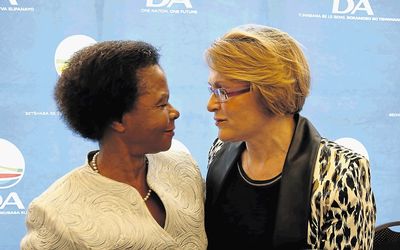
The swift unravelling of the coalition between Mamphela Ramphele’s Agang and Helen Zille’s Democratic Alliance has been a lesson for parties about the perils of jumping into bed too soon. Picture: SUNDAY TIMES
WESTERN Cape Premier Helen Zille will never forget the day Buddy Chaaban tried to lead a coup in the City of Cape Town.
The eccentric leader of the New People’s Party was invited to join a seven-party coalition that governed the City of Cape Town after the 2006 local elections.
No party won 50% of the vote, so with its 42%, the Democratic Alliance (DA) rounded up six rivals to join it in a coalition.
In no time, Chaaban felt the coalition government did not offer him a role that was in line with his perceived contribution or influence. He demanded the position of deputy mayor, threatening to take his support to the African National Congress (ANC).
"Of course, I did not let him," says Zille, who was Cape Town mayor between 2006 and 2011.
She has just completed a chapter on running that coalition administration for her much-anticipated book due later this year.
"It’s very hard to govern a coalition, especially when you have lots of parties, each of which has the balance of power to bring down the government," she says.
The prospects of coalition administrations in municipalities have increased since then as support for the ANC declines, and could be a game changer in several towns and cities in this year’s local elections.
Keeping small parties alive and competitive can be incredibly difficult, as they do not have the financial muscle and campaign platforms enjoyed by the bigger ones, says Themba Godi, who runs the one-man band African People’s Convention (APC).
He is chairman of Parliament’s powerful standing committee on public accounts, which keeps him in the limelight.
The APC has 29 councillors and Godi hopes to increase this to 100 after this year’s elections. Running small parties, he says, is made more difficult by a funding model that "favours those who already have".
The APC received R1m from Parliament’s equitable distribution last year, while the ANC, which has 249 MPs, got more than R200m.
"From that (R1m), we need to have offices, we need to hire staff, we need to buy material, we need to run programmes for the organisation," Godi says.
"Even for the APC, it does not even start to address the needs and the demands of the party, to reach out to people all over the country."
Larger opposition parties are gearing up for a battle to unseat the ANC in several constituencies.
The DA, which controls only Cape Town out of the eight major municipalities, smells blood in Nelson Mandela Bay and Tshwane, the two metropolitan councils in which the ANC is hanging precariously close to the 50% mark.
The elections in these cities provide opportunities for small parties to be "kingmakers" should there be no outright winner.
This brings into the game parties such as the United Democratic Movement (UDM), which is building a growing following in Port Elizabeth, where it surprisingly won a ward from the ANC in a by-election last year.
Political analyst Zamikhaya Maseti says the UDM cannot be discounted in the possible electoral deals likely to take place in Nelson Mandela Bay, where the ANC can be pushed out of office by an opposition coalition.
"Some voters in Nelson Mandela Bay see the UDM as an alternative."
Maseti says voters "not comfortable with the DA" or the ANC, or tired of Economic Freedom Fighters leader Julius Malema’s "tantrums" might "throw their weight behind General Bantu Holomisa’s party".
Holomisa says discussing coalitions at this stage is "a big no". It will "only be discussed after the results have been announced".
He says the UDM has been boosted by its recent successes in Port Elizabeth and is running new campaigns to ensure it does well in the elections.
A premature pre-election pact with the DA jeopardised new entrant Agang SA’s chances ahead of the 2014 elections. How the arrangement between Zille and Agang founder Mamphela Ramphele quickly unravelled remains one of the lessons as parties look at coalition possibilities, with most choosing to avoid early announcements.
The United Front, a new civic society "platform" linked to the National Union of Metalworkers of SA, could also be one of the kingmakers in Port Elizabeth. One of its leaders is former Nelson Mandela Bay mayor and trade unionist Zanoxolo Wayile.
He was left in the cold after the ANC booted him out of office and he dropped off the party’s parliamentary list.
Wayile says the ANC "has been hijacked by social parasites and there is no chance of saving it".
Last year, former deputy president Kgalema Motlanthe singled out Wayile as an influential politician in Nelson Mandela Bay, warning simultaneously about the pain that could be inflicted on the ANC by people it has discarded.
Wayile says some parties are trying to lure the United Front into a coalition pact, but he will not discuss the party’s plans.
DA federal executive chairman James Selfe says the party prefers to examine coalition opportunities only after the "electoral arithmetic has been done".
However, he recognises there are several opportunities for opposition parties to work with the DA to remove the ANC in some councils. He says there are many pitfalls in coalition governments, but the DA has learnt valuable lessons.
Zille says coalitions can be a "nightmare" to run. "When you have seven parties, everybody wants their little empire and then you start not being able to act as an integrated whole government, you start acting like little pieces of government, which then makes it very hard to implement a coherent policy and strategy."
But she considers the Cape Town coalition when she was mayor as a successful example — a platform that helped the DA win the municipality in the next elections.
One of the DA’s conundrums is which parties to work with should coalition opportunities emerge.
The ANC is out of the question, says Selfe. His party will choose partners that have an "intellectual and policy affinity" to the DA.
Political analyst Ebrahim Fakir says "coalitions of convenience" — alignments "merely premised on keeping the ANC out" — could appeal to some parties, but their chances of success are limited.
He does not see the EFF "having much in common with the DA".
The points of difference would be around the "the grand stuff in terms of nationalisation, organisational culture, respect for process, respect for orders, debate", he says.
Zille cautions about forming a coalition for the sake of it.
"If you are in power, you have to be able to run the government properly. There is really no point in being in power for power’s sake," she says.


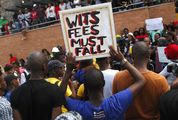
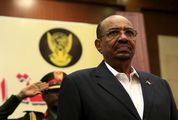




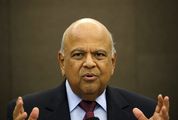
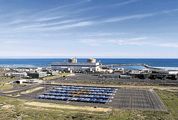


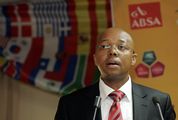











Change: -0.42%
Change: -0.35%
Change: -0.17%
Change: 0.14%
Change: -2.58%
Data supplied by Profile Data
Change: -0.56%
Change: -0.16%
Change: -0.42%
Change: 0.00%
Change: -0.48%
Data supplied by Profile Data
Change: 2.52%
Change: 1.45%
Change: 2.57%
Change: 3.24%
Change: 1.78%
Data supplied by Profile Data
Change: -0.38%
Change: -0.21%
Change: -0.59%
Change: -0.18%
Change: -3.10%
Data supplied by Profile Data